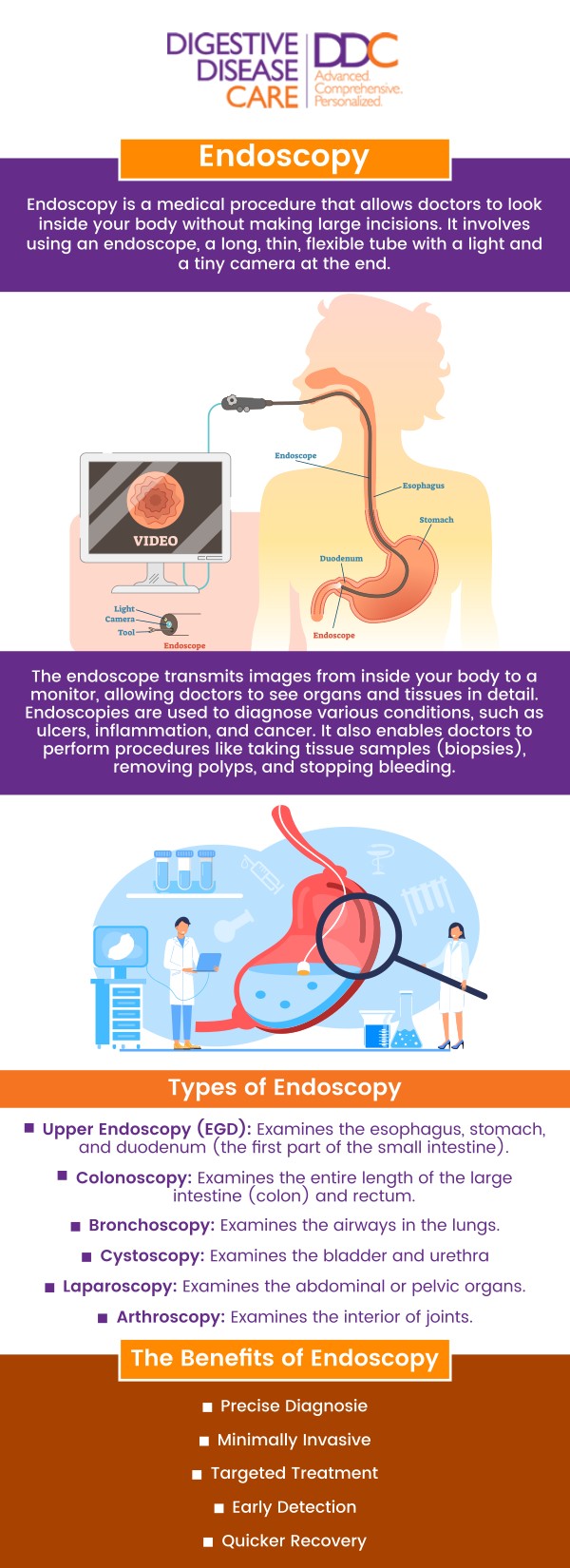Capsule Endoscopy Specialist Q&A
Capsule endoscopy is a noninvasive diagnostic procedure to visualize the inside of your digestive tract for disease diagnosis. Visit Digestive Disease Care (DDC) to get comprehensive care by a board-certified gastroenterologist. Contact us today for more information or request an appointment online. We have convenient locations to serve you in Babylon NY, East Setauket NY, Forest Hills NY, Jericho NY, Lake Success NY, Melville NY, Mineola NY, Massapequa NY, New Hyde Park NY, and Riverhead NY.




Table of Contents:
What is capsule endoscopy?
Am I a good candidate for capsule endoscopy?
How do I prepare for a capsule endoscopy?
What happens during a capsule endoscopy?
To get relief from your gastrointestinal symptoms, you need an accurate diagnosis. The board-certified gastroenterology physicians at Digestive Disease Care offer many diagnostic tests to determine the cause of your symptoms, including capsule endoscopy. To get the answers you need from a team who puts your health first, call the New York office most convenient to you, which includes Babylon, Lake Success, East Setauket, Mineola, and Jericho in Long Island, and Forest Hills in Queens, or book an appointment online today.
Capsule endoscopy is a diagnostic test offered at Digestive Disease Care. During the test, you swallow a capsule equipped with a tiny wireless camera that takes pictures of your digestive system and transmits them to a recording device.
The procedure is painless and allows the team at Digestive Disease Care to evaluate the middle part of your gastrointestinal tract (small intestines), which is a segment typically too difficult to assess during a traditional upper endoscopy or colonoscopy.
The gastroenterology experts at Digestive Disease Care determine if you’re a good candidate for capsule endoscopy. The team may recommend the procedure to diagnose:
• The cause of your gastrointestinal bleeding
• Low hemoglobin blood counts
• Cancer
• Celiac disease
• Crohn’s disease
• Irritable bowel syndrome
Endoscopy may also be recommended to confirm or rule out the cause of your gastrointestinal symptoms, such as abdominal pain, diarrhea, or anemia.
The team at Digestive Disease Care provides specific instructions on the steps you need to take to prepare for your capsule endoscopy. To get the best images, the team requests you stop eating and drinking at least 12 hours before your test. They may also prescribe a laxative to clear out your intestinal tract on the day of your procedure.
You may also need to modify your medication schedule to prevent interference with the test.
Your capsule endoscopy procedure starts at the Digestive Disease Care office. After reviewing the procedure with you, the team has you swallow the vitamin-sized capsule. The team provides specific instructions about eating, drinking, and activity to ensure you get the best imaging during your capsule endoscopy.
You’re then sent on your way to resume your usual activities. During your test, the capsule takes thousands of pictures of your intestinal tract and saves them. The process takes about eight hours from start to finish, and your body eliminates the capsule during a bowel movement.
The team has you retrieve and ship the capsule so they can evaluate the images, and schedule a follow-up appointment to discuss the results.
To learn more about capsule endoscopy, contact Digestive Disease Care by phone or online today. We have convenient locations to serve you in Melville NY, New Hyde Park NY, Forest Hills NY, Jericho NY, Mineola NY, Lake Success NY, Babylon NY, East Setauket NY, Massapequa NY, Riverhead NY and BEYOND.

Check Out Our 5 Star Reviews


Additional Services You May Like

Additional Services You May Like
- Abdominal Pain
- Acid Reflux
- Barretts Esophagus
- Bloating
- Capsule Endoscopy
- Celiac Disease
- Colon Cancer Screening
- Colonoscopy
- Constipation
- Crohns Disease
- Diarrhea
- Diverticulitis
- Esophageal PH Monitoring
- Fatty Liver
- Fibroscan
- Gallstones
- Gastroenterologist
- Gastric Chest Pain
- Gluten Intolerance
- Hemorrhoid
- Hemorrhoid Banding
- Hepatitis
- Irritable Bowel Syndrome
- Lactose Intolerance
- Pancreatitis
- Polyps
- Rectal Bleeding
- Stomach
- Ulcerative Colitis
- GI Urgent Care





